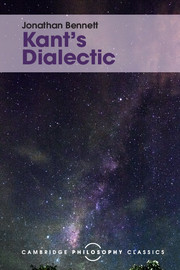Book contents
- Frontmatter
- Contents
- Preface to this edition by Karl Ameriks
- Preface
- System of references
- 1 Introduction
- 2 Concepts and intuitions
- 3 Substances and reality
- 4 The substantiality of the soul
- 5 The simplicity of the soul
- 6 The identity of the soul
- 7 Infinity
- 8 Limits
- 9 Divisibility
- 10 Freedom
- 11 God
- 12 Reason
- Index
- Frontmatter
- Contents
- Preface to this edition by Karl Ameriks
- Preface
- System of references
- 1 Introduction
- 2 Concepts and intuitions
- 3 Substances and reality
- 4 The substantiality of the soul
- 5 The simplicity of the soul
- 6 The identity of the soul
- 7 Infinity
- 8 Limits
- 9 Divisibility
- 10 Freedom
- 11 God
- 12 Reason
- Index
Summary
Inferences of reason
I have so far avoided Kant's theory about how reason generates the problems which are treated in the Dialectic. This theory, which is expounded in the Introduction, Book I and the Appendix to the Dialectic, is a bad one, and the Dialectic's main content is independent of it. Still, the theory of reason is sometimes invoked in discussions of specific problems; and it is also supposed to generate the architectonic – the over-all shape – of the material in Book II, explaining why the proper concerns of the Dialectic are exhausted by psychology, cosmology and theology. This architectonic is a clumsy attempt to rationalize a set of problems which reflect not the structure of reason but the preoccupations of German academic philosophers at the time when Kant was writing. Where the theory has an effect, it is by tempting Kant into a brutal and insensitive forcing of his material into unnatural shapes, and never by genuinely illuminating it. Still, the theory must be attended to.
What sort of faculty does Kant think reason to be? His main explanation, given in two sub-sections of the Introduction, is that reason is a faculty of making logical deductions. The understanding can also be used deductively, Kant says, but only with one premiss at a time, whereas reason's deductive task is the drawing of conclusions from pairs of premisses. He puts it like this:
If the inferred judgment is already so contained in the earlier judgment that it may be derived from it without the mediation of a third representation, the inference is called immediate… – I should prefer to entitle it inference of the understanding. But if besides the knowledge contained in the primary proposition still another judgment is needed to yield the conclusion, it is to be entitled an inference of the reason.
That is ambiguous. It is supposed to distinguish (a) arguments with one premiss from (b) arguments with two, but it could easily be taken instead to distinguish (a′) arguments in which the conclusion follows immediately from the premiss(es) from (b′) arguments in which the conclusion can be derived from the premiss(es) only with the aid of an intermediate lemma. Kant's central concern is with (a)/(b), but his use of ‘mediation’ and ‘immediate’ strongly suggests (a′)/(b′).
- Type
- Chapter
- Information
- Kant's Dialectic , pp. 261 - 291Publisher: Cambridge University PressPrint publication year: 2016

